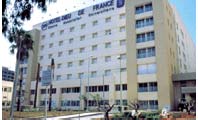 BEIRUT, 9 January (IRIN) – Alleged irregularities in a hospital survey last week have left the health sector in turmoil, say health workers. The survey report, conducted by a committee of Lebanese and Australian health professionals under contract with the health ministry, revealed that only 86 out of 160 of the country’s hospitals had received accreditation.
BEIRUT, 9 January (IRIN) – Alleged irregularities in a hospital survey last week have left the health sector in turmoil, say health workers. The survey report, conducted by a committee of Lebanese and Australian health professionals under contract with the health ministry, revealed that only 86 out of 160 of the country’s hospitals had received accreditation.
The survey compared the quality of healthcare services provided by each hospital to international standards. On the basis of the assessment, the health ministry issues contracts to hospitals, providing them with large percentages of their incomes. The Director-General of the Ministry of Health, Walid Ammar, defended the review. "The system is totally transparent," he said. "We informed hospitals of the standards, published the criteria in the official bulletin and provided hospitals with training." "The problem is that in Lebanon things become personal, and hospital directors take [negative assessments] as personal insults," Ammar said. "Accreditation is not a penalty, it’s an evaluation." "We encourage the non-accredited hospitals to improve their services because we know that they have the abilities for it," he added. On Saturday, Minister of Health Mohammad Khalifeh reportedly renewed the ministry’s contract with a number of non-accredited hospitals. Critics point out, however, that under Lebanese law, the ministry is obliged to close hospitals lacking accreditation. "The Minister is, without a doubt, in a difficult situation," noted Ammar. So far, no decisions on hospital closures have been taken. "There are some 20 hospitals that will never meet the requirements," Ammar explained. "But the goal is not for us to close them – they could become specialised hospitals, post-operative hospitals or resting houses." Some critics, however, said that unaccredited hospitals represented outright health risks. "Some non-accredited hospitals with which the ministry decided to renew its contracts are definitely dangerous and have to be closed down for the sake of the population," said the medical director of an accredited hospital in the capital, Beirut, who wished to remain anonymous. "It depends on which party or religious group the hospital is affiliated with and how influential that group is," the source added. Dr Gabriel Sabaa, director of the non-accredited al-Salam hospital in Tripoli, some 60 km from the capital, agreed. "The accreditation was neither honest nor accurate," he said. Al-Salam was accredited in 2002, but lost its accreditation after the latest survey. One public official said: "The results depended on which member of the committee was undertaking the survey. One of them systematically gave bad evaluations, others were much more generous." He hinted that financial incentives may have been involved. The first accreditation survey in Lebanon was held in 2002 by a committee from the Australia-based Overseas Projects Corporation with the support of the World Bank. In the meantime, dissatisfied hospital officials, from both accredited and unaccredited institutions, have formed a commission and are meeting on Monday to request a review of the survey results and the appointment of a new committee. According to Ammar, the ministry would respond to the allegations. "We have to respond to accusations of corruption, that the committee was bribed," he said. "We have created a commission in charge of answering all the objections in a scientific and technical manner."



